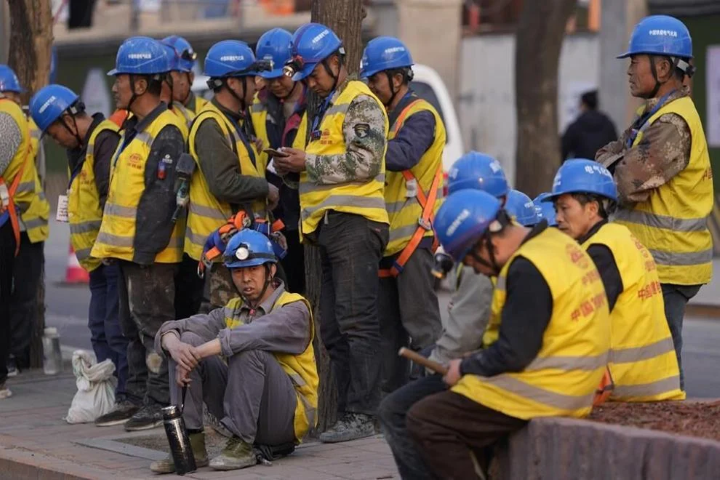
Workers wait for transport outside a construction site in Beijing, Tuesday, April 9, 2024. China's Finance Ministry has denounced a report by Fitch Ratings that kept its sovereign debt rated at A+ but downgraded its outlook to negative, saying in a statement that China's deficit is at a moderate and reasonable level and risks are under control
China's economy showcased unexpected vigor in the first quarter of the year, outpacing analysts' projections and displaying resilience amid ongoing challenges, official data revealed on Tuesday.
According to government figures released on Tuesday, the world's second-largest economy expanded by 5.3% annually from January to March, surpassing expectations set at around 4.8%. Additionally, compared to the previous quarter, the economy saw a growth of 1.6%.
Since the onset of the COVID-19 pandemic, China has grappled with a sluggish recovery, with diminished demand and a property market crisis dampening growth prospects.
The positive data emerged just days following reports of China's exports plummeting by 7.5% in March compared to the previous year, alongside weakened imports. Inflationary pressures eased, reflecting subdued demand amid the property sector turbulence.
Industrial output during the first quarter surged by 6.1% year-on-year, while retail sales expanded by 4.7% annually. Fixed investment in factories and equipment saw a growth of 4.5% compared to the corresponding period in the previous year.
Economist Louise Loo from Oxford Economics attributed the robust growth in the first quarter to a combination of factors, including strong performance in manufacturing, increased household spending during the Lunar New Year festivities, and supportive government policies boosting investments.
However, Loo cautioned that post-Lunar New Year, economic indicators for March suggested emerging weaknesses, coupled with unpredictable external demand conditions, as evidenced by a significant underperformance in exports.
She further noted that the normalization of household spending post-holidays, along with a cautious stance on government spending and stimulus measures, would likely influence growth in the subsequent quarter.
In efforts to bolster the economy, policymakers have rolled out a series of fiscal and monetary measures, aiming to propel growth. China has set an ambitious gross domestic product (GDP) growth target of around 5% for the year 2024.
Typically, robust economic growth in China would have a positive spillover effect on share prices across the region. However, on Tuesday, Asian shares experienced a sharp decline following a retreat in Wall Street stocks.
The Shanghai Composite index fell by 1.4%, while the Hang Seng in Hong Kong dropped by 1.9%. Likewise, the benchmark index for the Shenzhen market in southern China plummeted by 2.8%.
While stronger growth in China typically benefits its neighboring economies, which rely heavily on Chinese demand, the latest figures also hint at a possible restraint on further stimulus measures by the government.















